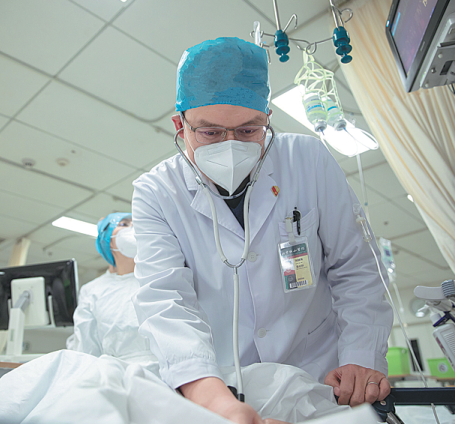They serve the public so most people can take the opportunity to relax
For some professions, holiday is busier time than usual.


The annual Labor Day holiday is approaching and this year tourism earnings are expected to reach a new high. The consensus among tourism experts suggests that traveler numbers might reach 200 million nationwide, the highest since 2017.
However, Qi Xuan is not one of them. An emergency department doctor with three-year experience at Chaoyang Hospital, she will spend the holiday working. Nothing unusual there as she had already worked through the Spring Festival and Qingming Festival.
"On our schedules there is actually nothing like a holiday or something like that", she said. "Emergency doctors take turns to work and rest and I happened to be working for all three successive public holidays. Actually, we emergency doctors do not have much sentimentality about these holidays."
A similar situation applies to the police. Bad things happen every day regardless of holidays or weekends. They take turns to work and rest, instead of following the calendar. In 2019, the media in Zhongshan city, South China's Guangdong province reported that a policeman, Huang Yong, had worked every Labor Day holiday for 20 successive years.
Huang joined the force in 1999 as an intern police officer; 20 years later he had been promoted to the head of the emergency team.
Wang Xudong, head of the emergency department at Aerospace Center Hospital, echoed Qi by saying that "actually on public holidays emergency doctors are busier than normal because the outpatient services are suspended".
At Wang's department, the number of patients often rises to 500 a day during holidays. Qi's department normally has the relatively lower number of 200. This involves two teams; one with three doctors for ordinary treatment and five doctors for more specialized procedures. Qi now serves in the latter team, ready to rescue any patient that's in critical conditions.
Help plus psychological counseling
"Generally there are about 15 critical patients every day," Qi said. She worked in ordinary treatment before, and she found that about half of those visiting emergency departments in hospitals do not really have "emergencies".
Some complain of slight stomachaches or headaches that are actually minor ailments but they have to be checked.
"On such occasions doctors will help them by not only solving problems, but also comforting them psychologically. We know they are OK, but we must let them know that so that they get rid of anxiety."




































